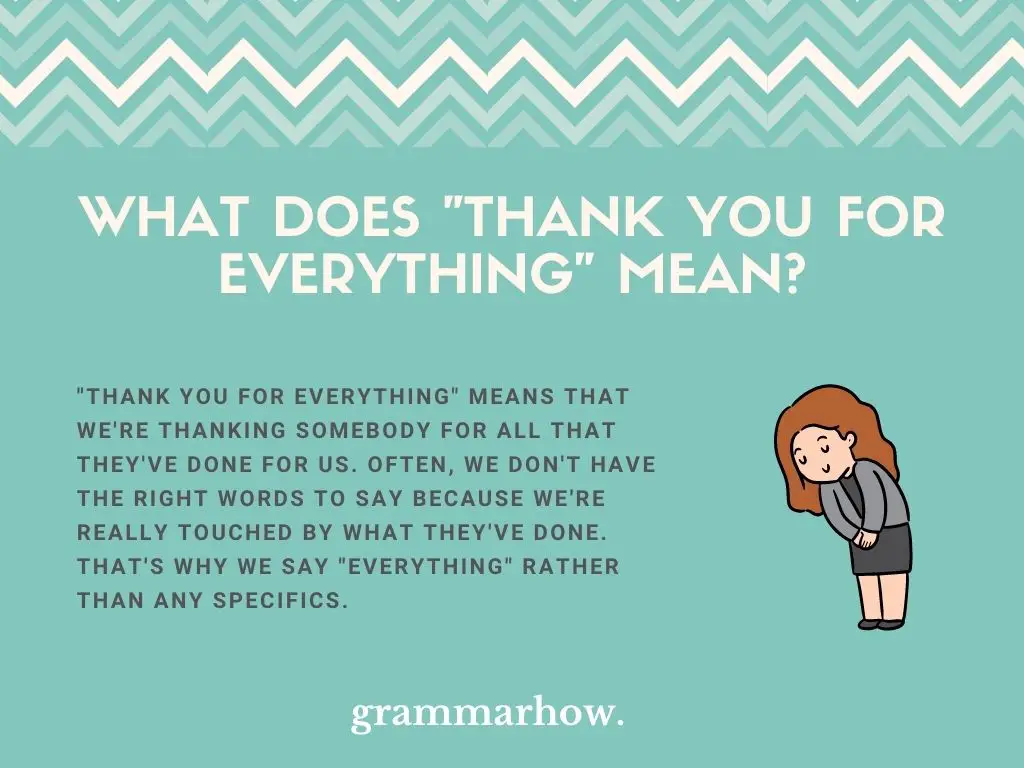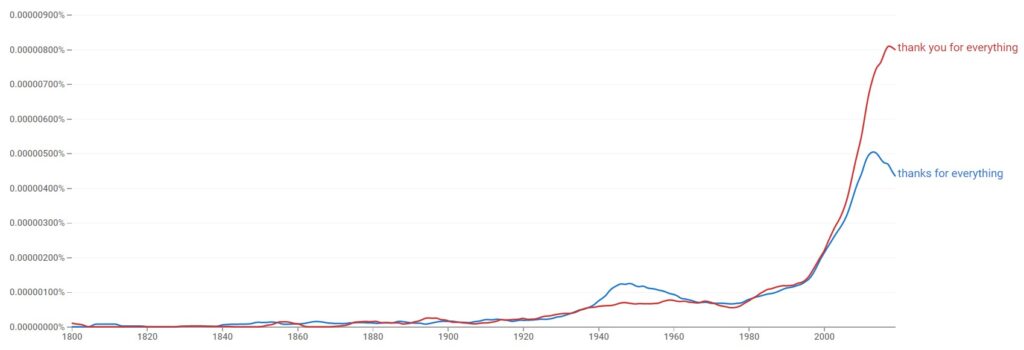Saying “thank you for everything” is something that many native speakers do when they can’t find the correct words to thank somebody. This article will look at its meaning and include some better alternatives that might help you make use of it.
What Does “Thank You For Everything” Mean?
“Thank you for everything” means that we’re thanking somebody for all that they’ve done for us. Often, we don’t have the right words to say because we’re really touched by what they’ve done. That’s why we say “everything” rather than any specifics.

You don’t need to include specifics in a “thank you” message for it to be authentic. You also don’t need to include them if there are simply too many things to name.
If somebody has gone above and beyond for you, you might often be lost for words. That’s why the phrase “thank you for everything” came about. It’s used when we can’t think of the right words to say, even if we know exactly what it is the other person has done for us.
Usually, someone will have given up their time to help us or have done things we wouldn’t expect somebody else to do. It’s also a common way to say “goodbye” to somebody, knowing that you probably won’t see them again and want to thank them for all they’ve done for you.
Should I Use “Thanks For Everything” Or “Thank You For Everything”?
We usually say both “thanks” and “thank you,” depending on the context of why we’re grateful for something. Native speakers don’t often differentiate between them, but there are some statistics that you might find useful here.
According to this graph, “thank you for everything” is more popular to write than “thanks for everything.” That’s because “thank you” is more impactful as a phrase than “thanks,” which is what we’re trying to convey.

“Thank you” is more polite and formal, which might also be the reason why it ranks so much higher on the above graph. We typically find more formal phrases in writing and use informal phrases in spoken English (which this graph doesn’t track).
However, the phrase “thank you for everything” means we’re unable to come up with the right words to thank somebody for something that they’ve done for us. That’s why “thank you” is slightly more popular, since it offers more impact than a simple “thanks” would.
Examples Of How To Use “Thank You For Everything” In A Sentence
Let’s go over using “thank you for everything” in a sentence. For the most part, it’s used as a way to say “goodbye,” knowing that we won’t see the person we’re talking to again for a long time.
We’ll include a few variations of it to help you understand which forms are best in which situations.
- Is there anything else I can do before you go?
- No, I’ve got it all, but thank you for everything you’ve done for me! I hope to see you again!
- Do you really have to leave?
- I’m afraid so, but thank you for everything! I’ll miss you.
- Is this the end, then?
- It seems likely. Thanks for everything! You were a true friend.
- Don’t say goodbye just yet!
- I have to! Thanks for everything, though! I couldn’t have done any of this without you.
- Do you need my help?
- No, but thank you for everything! You made this a lot easier for me.
Both “thank you” and “thanks for everything” are used when we don’t have the right words for what somebody has done for us. We want to show gratitude, but they’ve done too many things for us to single out and be specific about.
“Thank you for everything” groups everything that somebody has done for us into one thing. That helps us to explain how useful the things they’ve done were, without worrying about talking through each thing individually.
4 Better Ways To Thank Someone For Everything
While “thank you for everything” is already a great phrase to use, some people believe it’s lazy because you don’t come up with more specific details. That’s why we think these alternatives are better.
- I can’t thank you enough.
- Thank you for all you’ve done.
- Thank you for all your help.
- Thank you for all you are.
“I can’t thank you enough” is the best alternative and is used most by native speakers. We use it when we don’t believe we have the right words to thank somebody, and nothing we say or do will ever repay our debt to them.
I Can’t Thank You Enough
We use “I can’t thank you enough” when we can’t come up with reasonable and valid words to thank somebody for everything they’ve done for us.
If you hear somebody say this to you, it means they’ll forever be grateful for your actions or your presence in their life. It’s seen as one of the highest compliments you can receive from another person.
- I can’t thank you enough for giving me a chance at this job! I won’t let you down!
- I can’t thank you enough for being there for me in my time of need! You’re an angel.
- I can’t thank you enough for being the best friend a guy could ask for. You always go above and beyond for me.
The best part about “I can’t thank you enough” is that we don’t have to use it as a way to say goodbye (unlike “thank you for everything”). It’s more versatile, and we can use it with our closest friends, even if we’re going to see them again soon.
Thank You For All You’ve Done
“Thank you for all you’ve done” is a great way to be slightly more specific than “thank you for everything.” We’re talking about the things a person has physically “done” for us that have helped us out.
“Thank you for everything” struggles because it isn’t a specific phrase. We can’t find the right words to be appreciative, so we say “everything.” “All you’ve done” turns that around and shows that we care about all the things that somebody has done for us.
- Is there anything else I can do?
- No, but thank you for all you’ve done for me!
- Do you need me again?
- Not yet. Thank you for all you’ve done so far!
- Is there anything more I can do?
- I don’t think so. Thank you for all you’ve done, though.
Thank You For All Your Help
“Thank you for all your help” is another way to be more specific about your gratitude. This time, we’re talking about the things that somebody did to “help” us out in a situation that we struggled with.
“Help” and “done” in the previous phrase are synonymous with each other. They’re both talking about actions that people have done for us to help us out in a particularly tricky situation.
- Do you want me to help out?
- I couldn’t ask you again! Thank you for all your help previously, though.
- I’m more than happy to help if you need me to?
- No, thank you, but thank you for all your help.
- I’m so sorry I wasn’t there for you!
- Don’t worry about it! If it wasn’t for you, I wouldn’t be here today! Thank you for all your help.
You might also like: “Thank You For Your Effort” – 6 Better Ways To Praise Someone For Their Help
Thank You For All You Are
“Thank you for all you are” is an even more specific phrase that thanks a person specifically for being themselves. “All you are” talks about all the personality traits of the person and the things that make them special.
“Thank you for all you are” is the most complimentary phrase of the list we’ve provided. We use it for our closest friends and loved ones in our lives, and it’s used to thank somebody from the bottom of our heart for being themselves rather than for helping us with something.
- I just have to say thank you for all you are. If it wasn’t for your strength and commitment, I wouldn’t be here today.
- Thank you for all you are. You’re the best friend that anyone could ever ask for, and I’d be lost without you.
- Thank you for all you are. You really don’t know how special you are and how dearly I hold you in my heart.
You may also like: Is “Many Thanks” Proper English? 5 Alternatives To Saying “Many Thanks”
What Should I Reply To “Thank You For Everything”?
To reply to “thank you for everything,” you should say, “I know you would do the same.” This indicates that you appreciate the gratitude while also valuing the friendship of the person you’re speaking to.
- Thank you for everything.
- I know you would have done the same for me.
- Thank you for everything you’ve done for me!
- Don’t mention it! I know you would do the same.
You may also like: 26 Best Replies To “Thank You” (Formal & Informal)
Does “Thank You For Everything” Mean Goodbye?
Generally, “thank you for everything” is said when we’re not going to see someone again and want to thank them for what they’ve done. Therefore, it means “goodbye” in most cases, and we’ll rarely use it in any other sense.

Martin holds a Master’s degree in Finance and International Business. He has six years of experience in professional communication with clients, executives, and colleagues. Furthermore, he has teaching experience from Aarhus University. Martin has been featured as an expert in communication and teaching on Forbes and Shopify. Read more about Martin here.
